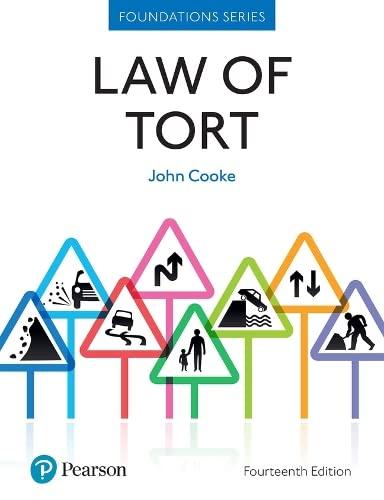Question
Tort Negligence True or False Answer 1.If a claimant brings a claim for the tort of negligence the court will first establish whether the respondent
Tort Negligence
True or False Answer
1.If a claimant brings a claim for the tort of negligence the court will first establish whether the respondent owes a duty of care in those circumstances and then decide whether his/her acts or omissions fell below the required standard of care so at to make him/her liable in negligence to the claimant. The standard required is subjective according to the defendant's personal circumstances.
2.Originally the tort of negligence was restricted to acts or omissions causing physical harm to persons or property but in 1963 the English House of Lords held that a person giving negligent advice could be held liable for loss in value of property I.e. economic loss without physical harm.
3.The tort of defamation consists of an oral statement made in private that lowers a person's standing amongst other optional factors.
4.The only remedy available for the tort of defamation is an award of damages
5.The substantial difference between a morally binding agreement and a legally binding contract is that the former has an intention by the parties to it to create legal relations whereas the latter does not
6.Apart from one or two exceptions set out in legislation, which should include some building work a contract does not have to be in writing to be enforceable at law
7.A contract can consist of an exchange of money for services or goods by the actual exchange itself e.g. buying something in a shop, or it can consist of an exchange of promises where delivery and payment are postponed so an action for breach can be based on either of two grounds, breach of terms by failing to carry out the contract correctly or breach of promise by a failure to perform at all
8.A contract exists when the following factors can be identified in an agreement: intention to createlegal relations; offer and acceptance; capacity to contract; genuine consent; absence of duress; legality of purpose; and consensus ad idem (I.e. agreement on what has been agreed to).
9.Freedom to contract on any terms the parties think fit is an important element of contract although in practice it can lead to unfortunate results where for example there may be inequality of bargaining power so that one party is taken unfair advantage of
10.In addition to express terms in a contract a court will imply terms into it if such terms are in common use in the trade to which the contract is related, regardless of whether such terms are essential for the operation of the contract.
Step by Step Solution
There are 3 Steps involved in it
Step: 1

Get Instant Access to Expert-Tailored Solutions
See step-by-step solutions with expert insights and AI powered tools for academic success
Step: 2

Step: 3

Ace Your Homework with AI
Get the answers you need in no time with our AI-driven, step-by-step assistance
Get Started


